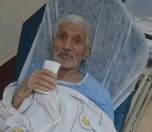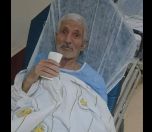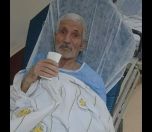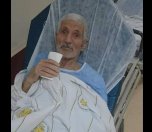'Tomorrow may be too late for Mehmet Emin Özkan'
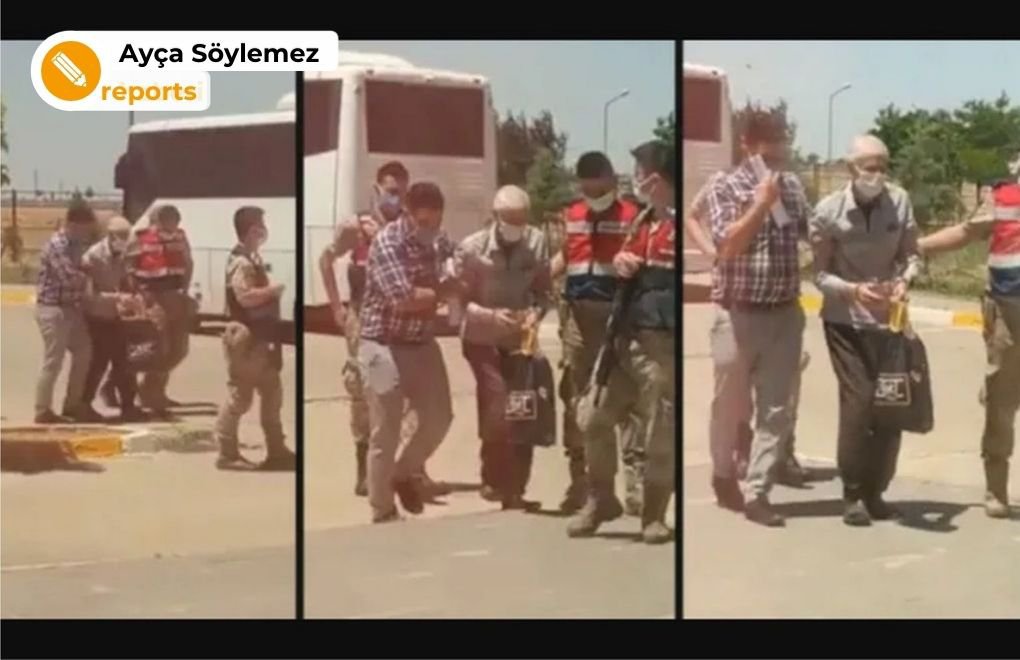
Click to read the article in Turkish / Kurdish
Mehmet Emin Özkan, 83, has been in prison for 25 years since he was sentenced to aggravated life imprisonment for a crime he had not commited. The only evidence in his conviction was the statements given by two informants, who later retracted their statements.
It is not just his family and lawyers who say that he did not commit the crime. The prosecutor's office and the courts have accepted with their indictments and judgements that Özkan was not the perpetrator of Bahtiyar Aydın's assassination in the Lice massacre.
However, while it has been confirmed that Özkan was not the perpetrator of the offense charged, he has been on trial for eight years for the offense in question and he is persistently not released.
Mehmet Emin Özkan was last seen in the media with a video of him captured while he was taken to the hospital. On the other hand, having difficulty walking, suffering from serious illnesses and taken to the hospital in handcuffs, Özkan has been given several reports by the Forensic Medicine Institution, indicating that he "could stay in prison."
Following the recent images, an campaign has been launched on social media for his release, saying "tomorrow may be too late" for Özkan.
We have talked to Mehmet Emin Özkan's lawyer, Serdar Çelebi, about the unlawfulness his client has been subjected to.
Indictment: No evidence showing his participation
Lawyer Serda Çelebi has answered our question "Why is Özkan, who is currently only an arrestee, not released?" as follows:
"The case has been going on for 8 years, the next hearing has been adjourned until September. But the court decided to wait for the outcome of the trial over the Lice massacre where the defendants were soldiers, though it had nothing to do with it. That file is at the Court of Appeals."
The file that Çelebi has referred to here is the court case in which the perpetrators of the Lice massacre were put on trial.
While Özkan, who was convicted of murdering Gendarmerie Regional Commander Bahtiyar Aydın in Lice massacre, was imprisoned for many years, in the case opened 20 years after the massacre, the prosecutor's office said that the one responsible for the massacre was Diyarbakır Gendarmerie Regiment Commander retired Colonel Eşref Hatipoğlu.
The Lice Case, in which the massacre that resulted in the murder of 14 civilians, a soldier and the then Gendarmerie Regional Commander Bahtiyar Aydın on 22 October 1993 in Diyarbakır's Lice was tried, ended with the acquittal of retired Colonel Eşref Hatipoğlu, who was the then Commander of the Diyarbakır Gendarmerie Regiment and the sole defendant.
While the court, in its ruling of acquittal, concluded hat Hatipoğlu was not responsible, it did not answer the question of who killed 16 people.
In the indictment of this case, it was stated that the responsible person was the soldier, not an organization, as it was said at that time.
In fact, the indictment stated that "No information was found that Mehmet Emin Özkan had participated in this action."
Mehmet Emin Özkan was also put on trial again eight years ago from the file in which he had been convicted, but he was neither released nor the evidence of the new file was evaluated.
The court has new evidence and file
Lawyer Serdar Çelebi has said, "The court has this new evidence in the case where Özkan is standing trial. The state's prosecutor has already made it clear that Özkan did not commit the murder. In this regard, an indictment was drawn up, accepted, and a trial was held. His execution should have been stopped in the first place, but the court did not do this."
Stating that his requests for release have been rejected for eight years, lawyer Çelebi has said the following in brief:
"The court is still waiting for the outcome of the other case. However, the outcome of that case has nothing to do with Özkan's file. The subject of the trial is whether the soldier is the perpetrator or not... How sound the judgment was, is another matter. However, the identification of the perpetrators has no causal connection with Özkan's case.
"Already in the indictment of the other case, it is determined by the evidence that Özkan did not commit the crime. What the court needed to consider was this indictment, which was prepared with new evidence. But the court insistently does not make a decision."
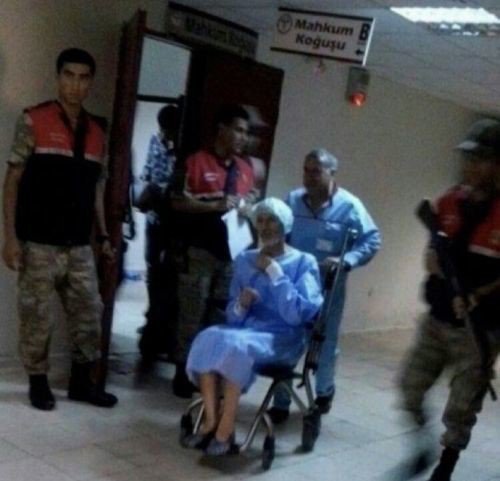
Reapplication for release
The conditions in the prison where Mehmet Emin Özkan has been held for a long time and illnesses due to his age got worse.
Expressing that his client's health situation has deteriorated, lawyer Çelebi has explained that many of their applications to the Forensic Medicine Institutioon resulted in the report of "he can stay in prison."
Özkan's lawyers have applied for a deferment of the execution, taking into account this latest situation. The result of this application is awaited.
Unable to walk or stand unaided
Özkan, who has a disability report of 87 percent, has high blood pressure. He has many chronic diseases such as hearing loss, digestive and respiratory disorders, and amnesia, due to the fact that he has been in a cell for many years. In addition, his life is at serious risk due to the inflammation in his brain and the heart attack he had in prison. Due to his illness, he cannot meet his personal needs alone, cannot walk or stand unaided.
According to the data of the Human Rights Association (İHD), there are at least 1,605 sick prisoners, 604 of whom are seriously ill.
What happened in Lice and the Lice case?On October 22, 1993, 16 people were killed in the Lice district of Diyarbakır, and many houses and workplaces were set on fire. Hundreds of people were forced to migrate. Among those who were killed was Brigadier General Bahtiyar Aydın. The indictment regarding the massacre was accepted a day before the statute of limitations, and the trial began on January 16, 2015, 21 years later. According to the indictment, contrary to what the authorities declared at that time, the Kurdistan Workers' Party (PKK) did not carry out the attack. Retired Colonel Eşref Hatipoğlu and First Lieutenant Tünay Yanardağ, who were determined as the perpetrators of the incident, were requested to get the sentences of aggravated life imprisonment and up to 24 years in prison on charges of "premeditated killing", "inciting people to rebel and killing each other", "forming an organization to commit crimes". The defendants were not arrested. The case was sent from Diyarbakır to Eskişehir and from there to Diyarbakır again, where the case was moved to İzmir since there was no high criminal court authorized under the Article 10 of the Anti-Terror Law (TMK). On June 13, 2014, the case was stopped. After the abolition of specially authorized courts, the First High Criminal Court of İzmir, arguing that the trial of the accused is subject to permission, decided that the trial should be stopped and permission should be given. The Third Chamber of the Supreme Council of Judges and Prosecutors (HSYK), with its decision on January 29, 2015, found the lawyers involved to be right and overturned the decision to stop the case, and decided to continue the case at the First High Criminal Court of İzmir. Tünay Yanardağ, one of the defendants, died in August 2015. Hatipoğlu remained the only defendant in the case. The victims' lawyers said they did not believe in Yanardağ's death and requested an investigation from the court, but their demands were not accepted. While the case ended with an acquittal, it was stated in the reasoned decision that it could not be determined who carried out the massacre. The file is at the Court of Cassation. |
(AS/DCE/SD)
bianet submits shadow report to UN Human Rights Committee

Imprisoned lawyer exposes use of disciplinary investigations to pressure political prisoners

Tap water ‘smells of bleach’ in Muğla prison

Censorship on a letter from prison describing hunger

Prisoner on hunger strike: 'I am alone without sunlight'






